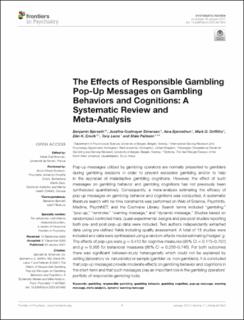| dc.contributor.author | Bjørseth, Benjamin | |
| dc.contributor.author | Simensen, Josefine Oudmayer | |
| dc.contributor.author | Bjørnethun, Aina | |
| dc.contributor.author | Griffiths, Mark D. | |
| dc.contributor.author | Erevik, Eilin K. | |
| dc.contributor.author | Leino, Tony | |
| dc.contributor.author | Pallesen, Ståle | |
| dc.date.accessioned | 2021-11-29T10:42:21Z | |
| dc.date.available | 2021-11-29T10:42:21Z | |
| dc.date.created | 2021-01-05T13:35:57Z | |
| dc.date.issued | 2021-01-25 | |
| dc.identifier.issn | 1664-0640 | |
| dc.identifier.uri | https://hdl.handle.net/11250/2831867 | |
| dc.description.abstract | Pop-up messages utilized by gambling operators are normally presented to gamblers during gambling sessions in order to prevent excessive gambling and/or to help in the appraisal of maladaptive gambling cognitions. However, the effect of such messages on gambling behavior and gambling cognitions has not previously been synthesized quantitatively. Consequently, a meta-analysis estimating the efficacy of pop-up messages on gambling behavior and cognitions was conducted. A systematic literature search with no time constraints was performed on Web of Science, PsychInfo, Medline, PsychNET, and the Cochrane Library. Search terms included “gambling,” “pop-up,” “reminder,” “warning message,” and “dynamic message.” Studies based on randomized controlled trials, quasi-experimental designs and pre-post studies reporting both pre- and post-pop-up data were included. Two authors independently extracted data using pre-defined fields including quality assessment. A total of 18 studies were included and data were synthesized using a random effects model estimating Hedges' g. The effects of pop-ups were g = 0.413 for cognitive measures (95% CI = 0.115–0.707) and g = 0.505 for behavioral measures (95% CI = 0.256–0.746). For both outcomes there was significant between-study heterogeneity which could not be explained by setting (laboratory vs. naturalistic) or sample (gambler vs. non-gamblers). It is concluded that pop-up messages provide moderate effects on gambling behavior and cognitions in the short-term and that such messages play an important role in the gambling operators' portfolio of responsible gambling tools. | en_US |
| dc.language.iso | eng | en_US |
| dc.publisher | Frontiers | en_US |
| dc.rights | Navngivelse 4.0 Internasjonal | * |
| dc.rights.uri | http://creativecommons.org/licenses/by/4.0/deed.no | * |
| dc.title | The effects of responsible gambling pop-up messages on gambling behaviors and cognitions: A systematic review and meta-analysis | en_US |
| dc.type | Journal article | en_US |
| dc.type | Peer reviewed | en_US |
| dc.description.version | publishedVersion | en_US |
| dc.rights.holder | Copyright 2021 the authors | en_US |
| dc.source.articlenumber | 601800 | en_US |
| cristin.ispublished | true | |
| cristin.fulltext | original | |
| cristin.qualitycode | 1 | |
| dc.identifier.doi | 10.3389/fpsyt.2020.601800 | |
| dc.identifier.cristin | 1865591 | |
| dc.source.journal | Frontiers in Psychiatry | en_US |
| dc.identifier.citation | Frontiers in Psychiatry. 2021, 11, 601800. | en_US |
| dc.source.volume | 11 | en_US |

